Crime and Public Safety
Roanoke Police are looking for the gunman who held up a convenience store across the street from Washington Park. Police say it happened late last night – no word on how much was taken.
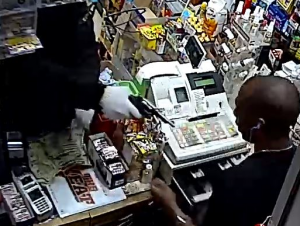
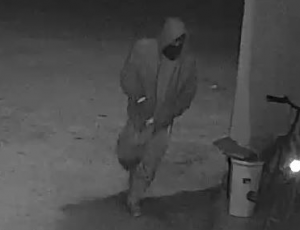 From Roanoke Police: On Tuesday, May 8 at around 11:30 p.m., Roanoke Police responded to a robbery call from a business in the 1600 block of Burrell St. NW. The clerk of the store told arriving officers a man came into the store and robbed them at gunpoint. The suspect is described as a black male wearing a black hooded sweatshirt, a black mask covering half of his face, and either white or light gray gloves . The suspect’s gun is described as a black revolver. The suspect stole an undisclosed amount of money and exited the store heading east. Roanoke Police Detectives would like to identify this suspect to further their investigation. If you know him, please call the RPD tip line at (540) 344-8500. You can also text in your tip by texting 274637. Please begin you text with the word “Roanoke PD” to make sure it gets to us. Both calls and texts can remain anonymous. Please reference case number 18-049106. All suspects are considered innocent until proven guilty.
From Roanoke Police: On Tuesday, May 8 at around 11:30 p.m., Roanoke Police responded to a robbery call from a business in the 1600 block of Burrell St. NW. The clerk of the store told arriving officers a man came into the store and robbed them at gunpoint. The suspect is described as a black male wearing a black hooded sweatshirt, a black mask covering half of his face, and either white or light gray gloves . The suspect’s gun is described as a black revolver. The suspect stole an undisclosed amount of money and exited the store heading east. Roanoke Police Detectives would like to identify this suspect to further their investigation. If you know him, please call the RPD tip line at (540) 344-8500. You can also text in your tip by texting 274637. Please begin you text with the word “Roanoke PD” to make sure it gets to us. Both calls and texts can remain anonymous. Please reference case number 18-049106. All suspects are considered innocent until proven guilty.

Mark Bell (Salem PD photo)
UPDATE: The victim in Monday’s shooting at a West Main Street convenience store in Salem has now been identified as 32-year-old Anthony Joseph Trovata of Shawsville, according to a City of Salem spokesperson.
(Previously reported) A man wanted for a fatal shooting in Salem has been arrested after a stand-off with police in Christiansburg. Authorities apprehended 32-year-old Mark Bell after a stand-off at a Days Inn that began around 1:30 this morning. It ended about two and a half hours later. A woman who was inside the motel room with Bell was also apprehended. Police were looking for Bell after he allegedly shot and killed another man just after 2 AM yesterday at the GoMart on West Main Street, that’s down the road from the Wal-Mart. Authorities say 29-year-old Angela Woolwine was with the victim at the time of the shooting. She’s facing multiple charges and is being held without bond.
From Christiansburg Police Department: The Montgomery County Sheriff’s Office and Christiansburg Police Department received information this morning that Mark Allen Bell – a suspect in a Salem homicide earlier this week – was located in a motel room at the Days Inn on Roanoke Street in Christiansburg.
Law enforcement arrived at the Days Inn at 1:24 a.m. and evacuated the motel guests into the lobby. Authorities from Montgomery County, Christiansburg, Blacksburg, Virginia State Police, Salem and Roanoke County were on scene.
Law enforcement made contact with Bell and a female inside the room, and both surrendered without incident at 4:09 a.m. Immediately after, the evacuation was lifted and motel guests were able to return to their rooms.
Mark Allen Bell, 32, of Roanoke, and Lauren June Leffler, 27, of Bedford, are in custody with the Montgomery County Sheriff’s Office.
05/08/17
From Salem Police Department: Salem Police are asking that anyone having information concerning the whereabouts of Mark Allen Bell to contact them immediately. The 32-year-old Roanoke man is suspected of shooting and killing another male early this morning on West Main Street in Salem.
At approximately 2:04 a.m., Salem Police Officers responded to the 1900 block of West Main Street in reference to shots fired. Upon arrival at the Go Mart convenience store, officers located a male subject in the parking lot suffering from a single gunshot wound. He was transported to Carilion Roanoke Memorial Hospital where he later died, as a result of the shooting.
Bell is charged with Second Degree Murder, Possession of Firearm by a Convicted Felon, Use of a Firearm in Commission of a Felony, Reckless Handling of a Firearm and Discharge a Firearm within the City Limits.
After further investigation, a female who was with the victim at the time of the shooting, Angela Woolwine, 29, of Roanoke, was charged with Possession of a Controlled Substance with Intent to Distribute. She is being held at the Roanoke County-Salem Jail on a secured bond.
Anyone with information on Mark Allen Bell’s whereabouts can contact the Salem Police Department at 540-375-3010.
 From News Release: Virginia State Police Trooper S. A. Richardson is investigating a two-vehicle crash which resulted in a fatality. The crash occurred Friday, (May 4), 2018 at 10:30 p.m. on Route 220, one tenth of a mile south of Route 718 in Franklin County.
From News Release: Virginia State Police Trooper S. A. Richardson is investigating a two-vehicle crash which resulted in a fatality. The crash occurred Friday, (May 4), 2018 at 10:30 p.m. on Route 220, one tenth of a mile south of Route 718 in Franklin County.
A 2000 Ford Mustang was traveling south on Route 220, when the vehicle ran off the right side of the roadway, lost control, then crossed the median striking a 2012 International tractor trailer.
The Mustang was driven by Greyson David Gsell, 30, Summerfield, NC. Mr. Gsell was wearing his seatbelt and was transported to the hospital for injuries received in the crash. The passenger, Zachary James Houlik, 22, was also wearing his seatbelt and died at the scene.
The crash remains under investigation.
 UPDATE from Roanoke Police: At 10:22 a.m., Roanoke Police responded to calls of a possible threat at the SunTrust bank at 10 Franklin Road. Once there, officers determined the threat was made by a customer over the phone to an employee at the bank. Bank employees pulled the fire alarm to evacuate the entire building, as a precaution. Parts of Jefferson Street, Franklin and Williamson Roads were shut down during the investigation. Roanoke Police conducted a thorough search of the building, and no immediate threat was identified. The building and roads were cleared and reopened at 11:15 a.m. The suspect is known and is not local to the Roanoke Valley. No arrests have been made at this time. The case is still under investigation.
UPDATE from Roanoke Police: At 10:22 a.m., Roanoke Police responded to calls of a possible threat at the SunTrust bank at 10 Franklin Road. Once there, officers determined the threat was made by a customer over the phone to an employee at the bank. Bank employees pulled the fire alarm to evacuate the entire building, as a precaution. Parts of Jefferson Street, Franklin and Williamson Roads were shut down during the investigation. Roanoke Police conducted a thorough search of the building, and no immediate threat was identified. The building and roads were cleared and reopened at 11:15 a.m. The suspect is known and is not local to the Roanoke Valley. No arrests have been made at this time. The case is still under investigation.
PREVIOUS: A bomb threat has led to the closure of several downtown Roanoke streets this morning as police investigate. Officials say the threat forced evacuation of the SunTrust building, and police have closed portions of Jefferson Street, Franklin Road, Church Avenue and Williamson Road until the all-clear is sounded.
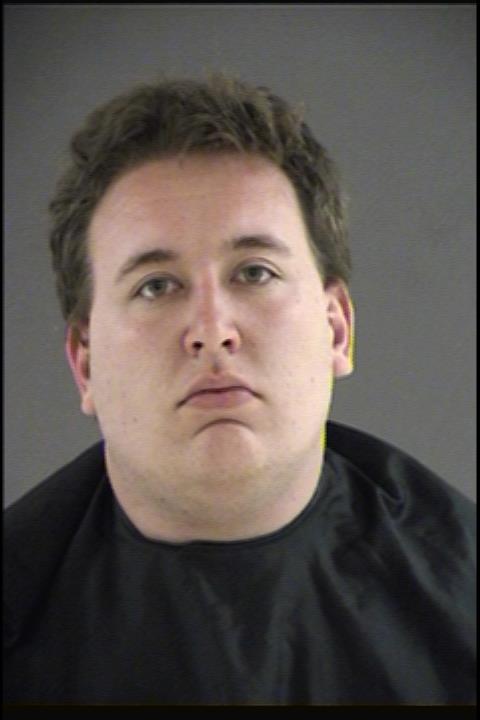 The following subject was arrested in May 1, 2018 in connection with an ongoing Southern Virginia Internet Crimes Against Children investigation.
The following subject was arrested in May 1, 2018 in connection with an ongoing Southern Virginia Internet Crimes Against Children investigation.
Joshua David Perdue, 21 years of age, of Moneta, VA was charged and arrested on the following charges:
(8) counts of 18.2-374.3 – Use of a communication device to facilitate certain offenses involving children
(1) count of 18.2-370 – Taking indecent liberties with children
(1) count of 18.2-374.1 – Solicitation of child pornography
A North Carolina man got much more than a ticket after a traffic stop overnight on I-81. The Montgomery County Sheriff’s office says deputies discovered drugs and more than 35-thousand dollars in cash inside the vehicle. 25-year-old Kenneth Rowland of Charlotte faces multiple charges.
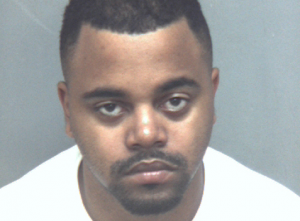
Kenneth Rowland (MCO photo)

(MCSO photo)
News release: On May 1, 2018 Kenneth E. Rowland, 25 years old, of Charlotte, NC was arrested for Possession w/intent to Distribute Schedule I/II Drugs, Possession w/intent to Distribute Marijuana, Possession of Firearm w/Schedule I/II Drugs, and Driving Suspended. The arrest came after deputies of our office conducted a traffic stop on his automobile on I-81 in Montgomery County. Rowland was driving a 2000 Dodge Dakota when he was stopped for traffic related offenses in the Highway Safety Corridor of I-81 around midnight. During the stop deputies discovered and seized drugs, a firearm, and more than $35,000 in cash that was located in the vehicle. Rowland was subsequently arrested and is being held in Montgomery County Jail with no bond.
(UPDATED 3PM) The children have been safely located and the Camille Crumbly taken into custody. For further information, please contact the Roanoke City Police Department.
(Earlier, police issued an Amber Alert for two missing Roanoke children who were believed to be with their mother – who is not allowed to have contact with them. Five-year-old Bailey Crumbly and four-year-old Gauge Clinton were last seen at their grandmother’s house last night. Police believed they were headed toward Indiana with their mother in a U-Haul pickup truck with Arizona plates.)

Bailey Crumbly/Gauge Clinton (RPD Facebook photo)

Tineshia Mack/Camille Crumbly (RPD Facebook photo)
News release: Roanoke Police need your help locating two missing juveniles. 5-year-old Bailey M. Crumbly and 4-year-old Gauge M. Clinton were last seen at their grandmother’s house in the 2900 block of Ravenwood Ave NW Sunday night, but were missing from the home Monday morning. They are believed to be with their mother, Camille Marie Crumbly, and her girlfriend, Tineshia Monae Mack. Crumbly is a non-custodial parent and is not allowed to have contact with the children. Crumbly is now facing charges of abduction and violation of court orders related to this incident. Both Crumbly and Mack have several active warrants unrelated to this incident.
They are believed to be traveling north towards Indiana in a white, 2018 GMC Sierra U-Haul pickup truck with Arizona license plates AH 96145. They may be traveling with at least one other juvenile. Anyone with information on their immediate location is asked to call 911 or our tip line at (540) 344-6681.
 A man accused of shooting into a vehicle in Pulaski yesterday afternoon was arrested after police responded to a shots fired call at the Washington Square Apartments around 3:40 pm. After getting a description of the suspect, Laredadian Banian was brought into custody about four hours later near Bob White Boulevard after a short chase on foot – and a manhunt by numerous armed officers. He was charged with possession of a firearm by a convicted felon.
A man accused of shooting into a vehicle in Pulaski yesterday afternoon was arrested after police responded to a shots fired call at the Washington Square Apartments around 3:40 pm. After getting a description of the suspect, Laredadian Banian was brought into custody about four hours later near Bob White Boulevard after a short chase on foot – and a manhunt by numerous armed officers. He was charged with possession of a firearm by a convicted felon.
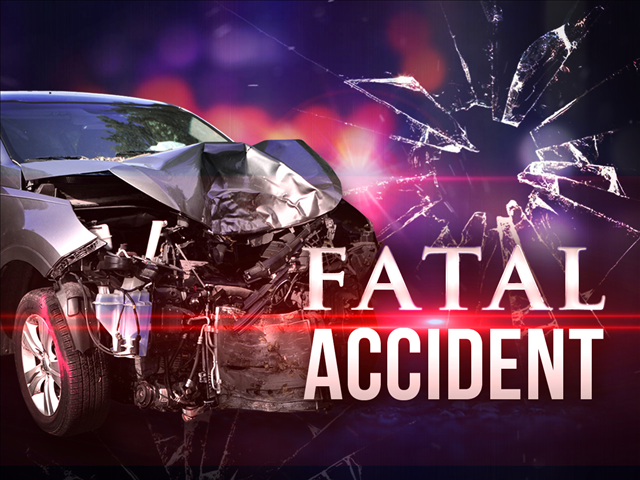
State Police say speeding was a factor in yesterday’s accident that killed two people and blocked southbound Interstate 81 for hours. Troopers identify the victims as 61-year-old Emma Beckwith and 58-year-old Wanda Alexander, both from Florence, Alabama. Police say they were rear-seat passengers in a vehicle that was rear-ended by a speeding SUV; both were ejected in the resulting crash. Troopers say a Mississippi man was driving the SUV and charges are pending.
From State Police: SALEM, Va. – Virginia State Trooper C. Viera-Cintron is investigating a two vehicle crash on Interstate 81 in Roanoke County which resulted in two fatalities. The crash occurred at 11:15 a.m. on Interstate 81, southbound, at the 139.9 mile marker, just south of exit 140. A 2015 Acura RDX was traveling south on Interstate 81 at a high rate of speed in the left lane, when the vehicle ran off the left side of the roadway and struck the guardrail. The driver then lost control and the vehicle and struck a 1999 Ford Explorer; also traveling south on Interstate 81. Both vehicles then ran off the right side of the roadway and struck the guardrail, ejecting one of the rear seat passengers from the Ford. The vehicles then came back into the southbound lanes, at which time the Ford Explorer overturned, ejecting another rear seat passenger. The Acura RDX again left the right side of the roadway striking an embankment, overturning multiple times and came to rest in the tree line.
The 2015 Acura was driven by Ralph Carl Bryant, 65; the passenger, Joan Dickerson Bryant, 65, both of Brookhaven, MS, were wearing their seatbelts and transported to Roanoke Memorial Hospital for injuries received in the crash. The 1999 Ford was driven by Enid Beckwith, 59, of Memphis, TN, and front seat passenger, Annie Beckwith, 63, of Florence, AL; both were wearing their seatbelts and were transported to Roanoke Memorial Hospital for injuries received in the crash. The rear seat passengers, Emma Beckwith, 61, and Wanda Alexander, 58, both of Florence, AL, were not wearing seat belts; both were ejected and died at the scene.
Interstate 81 Southbound was closed from 11:25 a.m. until 4:39 p.m. All southbound traffic was diverted off the Interstate to Route 11 while the Virginia State Police Accident Reconstruction Team and the Virginia State Police Bureau of Criminal Investigation (Salem Division) reconstructed the crash scene. Charges are pending.








